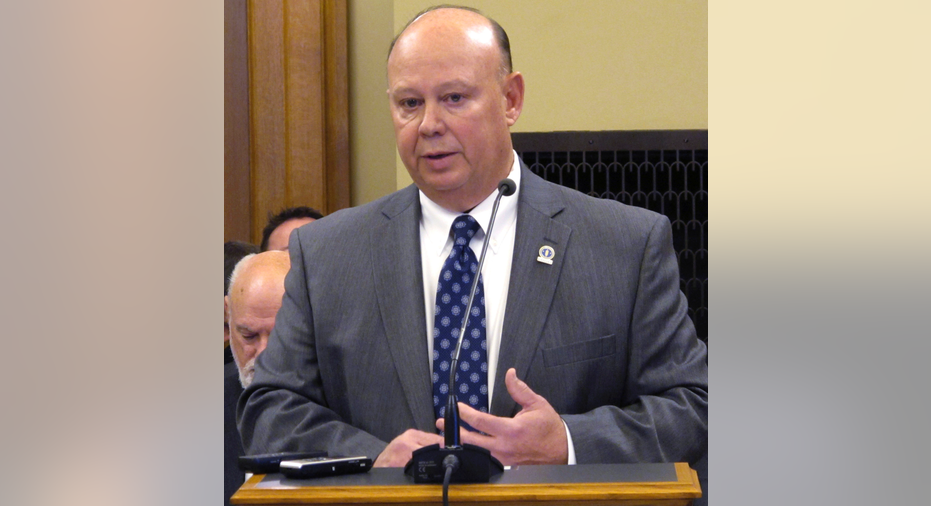Kansas plan for new prison draws criticism from lawmakers

TOPEKA, Kan. – A plan to have the largest private prison operator in the U.S. build a new state prison for Kansas immediately faced bipartisan criticism from legislators Thursday because the state would pay for the project by leasing the facility from the company for 20 years.
The state Department of Corrections announced that it selected Core Civic Inc., based in Nashville, Tennessee, to oversee construction of a new prison in Lansing, near Kansas City. The new lockup for 2,400 inmates would replace the state's oldest and largest prison on the same site.
Most legislators don't dispute the need to replace the existing prison, which has space dating to the 1860s. But even as lawmakers authorized the project earlier this year, some wanted to take the more traditional approach of issuing state bonds to finance construction. Those lawmakers are at odds with the department over whether using bonds would be cheaper over time.
State law still requires legislative leaders and Republican Gov. Sam Brownback to formally sign off on the department's plan next month for the two-year, $170 million project to go forward. Ahead of that decision, the department outlined its plan Thursday to a legislative committee that reviews building projects — and the panel recommended delaying the project to solicit new proposals to finance the prison with bonds.
Republican Rep. J.R. Claeys, of Salina, even suggested corrections officials engineered the selection process to result in a lease-purchase deal with CoreCivic.
"I just don't think that the way that this was set up, that it smells right," Claeys said.
The state took bids for the project but limited it to companies with experience in building prisons. It received proposal from CoreCivic and another private-prison company, GEO Group of Boca Raton, Florida, and CoreCivic's was significantly less expensive. Neither company proposed a bond-financed project.
CoreCivic, formerly Corrections Corporation of America, owns, controls or manages more than 80 facilities in 20 states and the District of Columbia, with roughly 90,000 beds. It reported revenues of $1.85 billion in 2016.
The company has faced questions in lawsuits and critical audits about its operations in at least six states, including Kansas, and the District of Columbia. But President and CEO Damon Hininger told reporters Thursday that more than 90 percent of its government contracts are renewed.
According to the secretary of state's office, the company has five registered lobbyists in Kansas, including Hininger.
The lobbyists also include David Kensinger, a confidante and former chief of staff to Brownback. Records show he registered Nov. 13 and expected to spend less than $1,000 in lobbying for the firm before the end of the year.
Steve Owen, a CoreCivic managing director, said in an email that Kensinger was hired to advise the company, which finds it best to "engage local experts." But, Owen said, the company's own staff handled responses and negotiations with the department.
And Brownback's office said he wasn't involved in CoreCivic's selection.
Democratic state Sen. Laura Kelly, of Topeka, a critic of the lease-purchase agreement, said: "It doesn't surprise me that CoreCivic would think this would slide through and hire an influential lobbyist."
As Corrections Corporation of America, the company contributed $2,000 to Brownback's campaign fund in 2009, ahead of his successful 2010 bid for governor, records available online show. The firm also donated $2,000 to then-Democratic Gov. Kathleen Sebelius' 2006 re-election campaign.
State officials contend a modern prison in Lansing would be safer while operating with 46 percent fewer employees. The oldest parts of the prison feature long tiers of cells that are harder to manage than a modern housing pod.
Corrections Secretary Joe Norwood told the legislative building committee that a lease-purchase agreement is the best option because annual payments would be predictable and CoreCivic would assume the risk of cost overruns.
"I haven't heard much dissent that there's a real need to replace the Lansing facility," Norwood said.
The firm would only oversee construction, hiring local subcontractors, then handle repairs and upkeep. Hininger said the company would be "completely on the hook" financially.
"The solution that we're bringing to the table is a complete risk transfer," he told reporters.
When legislators approved the project earlier this year, they authorized up to $155 million in bonds. The department now says the amount was too low because construction costs have risen.
A state audit in July suggested bond financing would be cheaper over time. Kelly dismissed the department's argument that the conclusion was dependent on now-outdated cost estimates and said a lease-purchase agreement is likely to be more profitable for CoreCivic.
The state would commit to an annual payment starting at $15 million, with lease, maintenance and insurance costs totaling $362 million over 20 years.
Staffing would be lower at the new prison — 371 employees instead of the current 682 positions — but 133 of the existing jobs, or nearly 20 percent, are vacant.
___
Follow John Hanna on Twitter at https://twitter.com/apjdhanna .



















